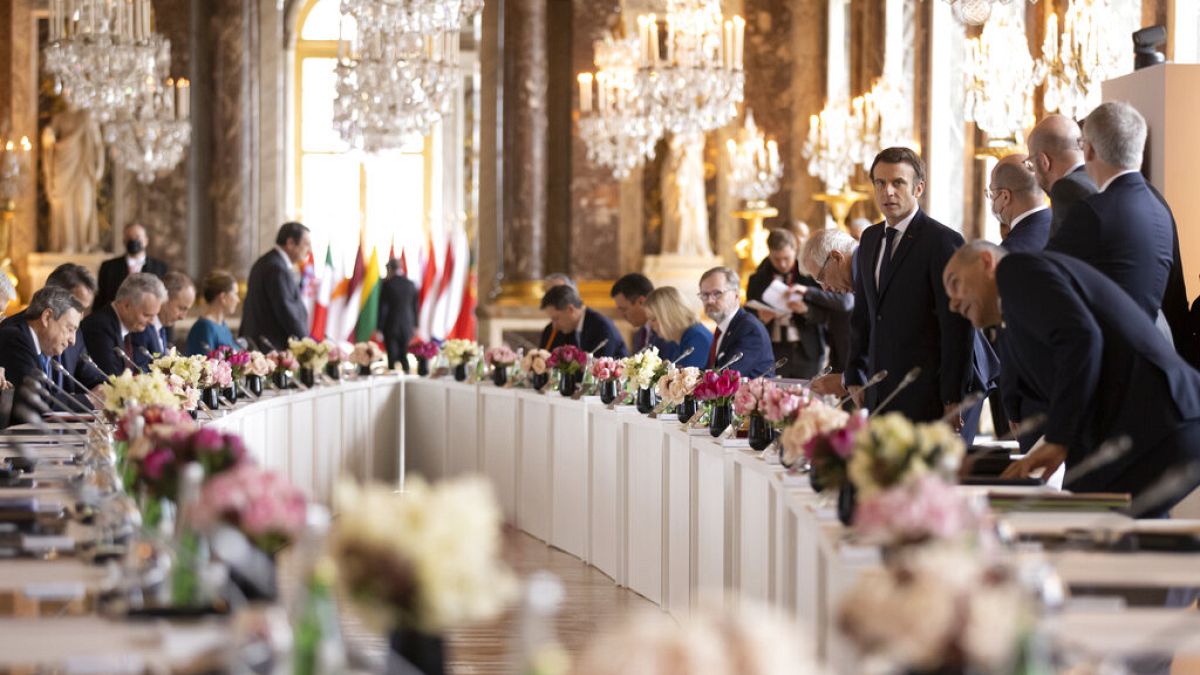EU leaders met in Versailles this week for an informal two-day summit.
In Versailles in 1919, the victorious allies in World War I hammered out a peace settlement for Europe that ultimately only laid the groundwork for more bloodshed engulfing the continent 20 years later.
This week, EU leaders met at the same place as the war raging at Europe's eastern gate went into its third week.
At the top of the agenda in Versailles: how to punish Russia further without doing too much harm to the European economy?
Earlier this week, the EU Commission presented plans to reduce Russian energy imports by two-thirds by the end of the year.
Yes, some wanted more, but there are limits to economic self-sacrifice member states are willing to commit to.
"I would not plead to cut off our supplies of oil and gas today from Russia. It's not possible, because we need the supply and that's the uncomfortable truth," Dutch Prime Minister Mark Rutte said.
At the same time, EU leaders poured cold water on Kyiv's calls for a fast-tracked accession that would see Ukraine join the bloc in record time.
Ever since the war broke out, Ukraine's president, Volodymyr Zelenskyy, and his top officials have repeated calls for an accelerated entrance, an unheard-of option that defies the traditionally complex and lengthy negotiations.
But at Thursday's meeting in Versailles, member states only "acknowledged the European aspirations and the European choice of Ukraine" and took note of the application that Zelenskyy signed on 28 February, rather than fulfilling Zelenskyy's request.
Another uncomfortable truth is that arming Ukraine is easier said than done.
There were repeated appeals from Ukraine for more warplanes.
But the United States rejected a Polish offer to send its MiG-29 fighter jets to Ukraine, saying the proposal raised "serious concerns" for the entire NATO alliance.
Other western governments also made clear that there was zero appetite for replenishing the Ukrainian air force.
“We've also provided all kinds of equipment and individual weapons," German Chancellor Olaf Scholz said. "Otherwise, we must consider very carefully what we do in concrete terms, and that most certainly doesn't include fighter planes."
The Ukrainians try to make their case by pointing at what they believe were Russian atrocities on the ground, such as the shelling of a children's hospital in Mariupol that local authorities called "a war crime without any justification".
Yet, what exactly constitutes a war crime is precisely defined – and hard to prove.
And whether Vladimir Putin personally will ever be brought to justice is, given the circumstances, highly unlikely.
Marti Flacks, director of the Human Rights Initiative at the Centre for Strategic and International Studies says it would be complicated to bring a solid case against the Russian president.
"International law is very clear that heads of state do not have immunity from prosecution at international tribunals," Flacks told Euronews.
"The International Criminal Court itself has brought charges against a number of heads of state: Omar al-Bashir in Sudan, Moammar Gadhafi in Libya, Laurent Gbagbo in Cote d'Ivoire, but bringing charges against the head of state and actually securing their participation as a defendant in a criminal trial are two very different things."
"A standard for conviction and an international criminal court is extremely high. The expectation for prosecuting someone for war crimes and crimes against humanity is to be able to demonstrate individual responsibility and be able to demonstrate that they are directing or responsible for a policy of committing these crimes," he continued.
"And that can be very difficult, especially when you don't have the cooperation of the state from which that kind that person originates, which we would obviously not have in the case of Russia."
